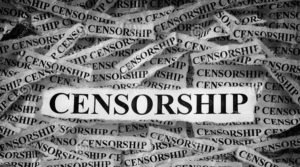The EU tightens censorship on virtual communication networks with new binding rules against “disinformation”
What began as a “voluntary code of conduct” by the EU on disinformation, affecting tech and virtual communication companies, is now set to become a binding code of conduct for the most influential and widely used platforms.

This was announced by the Irish media regulator Paul Gordon, who spoke to journalists in Brussels. The EU Commission has not yet confirmed officially that the current code will be “formalised” in this way in January 2025.
The legislation that would enable the “transition” is the controversial Digital Services Act (DSA), often referred to by critics as the “EU online censorship law,” the enforcement of which started in February this year.
The so-called “voluntary” code is currently signed by 44 tech companies. When it becomes mandatory in January 2025, it will apply to those defined by the EU as very large online platforms (VLOPs) (with at least 45 million monthly active users in the 27-nation bloc) and Very Large Online Search Engines (VLOSEs).
The number of these platforms is currently estimated at 25, plus at least two giant search engines.
In its current form, the DSA requires online platforms to conduct risk assessments regarding “disinformation” and to disclose the measures they take to mitigate the risks identified in those assessments.
But when the code switches from “voluntary” to mandatory, these obligations will also include other requirements: demonetizing the dissemination of “disinformation”; platforms, civil society groups, and fact-checkers “effectively cooperating” during elections, once again to address “disinformation”; and “empowering” fact-checkers.
This refers not only to the spread of “fact-checking” in the EU member states, but also to the funding of these groups by the VLOPs. And this despite the fact that many of the best-known “fact-checkers” are repeatedly accused of promoting censorship instead of checking content impartially for its accuracy.
The code was first introduced (in its “voluntary” form) in 2022, with Google, Meta and TikTok among the prominent signatories – while these rules come from a “strengthened” EU Code of Conduct on Disinformation, based on Commission guidelines published in May 2021.
“It is for the signatories to decide what commitments they undertake and it is their responsibility to ensure the effectiveness of the implementation of their commitments,” the EU said at the time – that would have been the “voluntary” element, while the Commission said at the time that it had not “endorsed” the code.
It looks like the European Commission will now “endorse” the code, and there are active preparations to make it binding.
Von der Leyen wants to “vaccinate” the EU population against “wrong thinking”
At the Democracy Summit in Copenhagen, EU Commission President Ursula von der Leyen perversely proclaimed that EU citizens must be “vaccinated against disinformation.”
Von der Leyen Promises to 'Vaccinate' EU Population Against 'Wrong Thinking'
According to Ursula, who is currently facing a criminal case over the EU government's strange contracts with pharmaceutical companies , people in society who hold views that contradict the globalist… pic.twitter.com/fK0wKV6tUQ
— “Sudden And Unexpected” (@toobaffled) October 22, 2024
yogaesoteric
November 8, 2024
